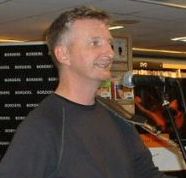Folk Artist Digs Through Woody Guthrie Archives
Nick Krewen
Music,
The Toronto Star
July 27, 1998
Mention the name Woody Guthrie and visions of a serious, poker-faced dust bowl balladeer spring to mind.
Whether it’s such socially and politically charged anthems as “Vigilante Man,” “Do-Re-Mi,” or his most famous classic “This Land Is Your Land,” the Oklahoma-born Guthrie is indelibly etched in American folklore as the premier musical biographer of post-Depression life in the ’30s and ’40s.
He is also remembered as the songwriting idol who fueled the creative fire within Bob Dylan, spurring the young folkie from Hibbing, Minnesota to a besides vigil at a New York hospital where Guthrie spent the last 15 years of his life suffering from Huntington’s Chorea.
“There’s so much more to the story,” says Billy Bragg, the London-born protest singer who plans to add a few chapters of his own and give you a glimpse of the Woody Guthrie you didn’t know tomorrow (Tuesday) night at the Phoenix Concert Theatre.
Bragg’s authority on the subject, surprisingly, is as collaborator.
Over the past three years, and at the invitation of Woody’s daughter Nora, Bragg has enjoyed open access to The Woody Guthrie Archive and thousands of completed lyric sheets. They were songs that had never been recorded, the music lost forever when Guthrie died in 1967.
Nora Guthrie approached Bragg to write some original music and bridge the gap of lost generations. It was an offer Bragg couldn’t refuse.
“I saw it as a chance to add to his canon, because his archives included 2500 plus songs,” said Bragg, 40, last week in between flights from the Washington airport.
“Ninety-five percent of his songs have never been heard.”
He invited Chicago-based alternative roots band Wilco along for the ride.
“I wanted to bring an American perspective to it,” Bragg explains. “I’d been familiar with Jeff Tweedy in Uncle Tupelo, and I knew that if I whispered this project in his ear, he’d understand. I also felt that Wilco would give it the continuity because they’re a band.”
Buoyed by a guest list including pedal steel guitarist Bob Egan, singer Natalie Merchant and lap guitarist Corey Harris, Bragg and Wilco recorded a superb 15-song collection called Mermaid Avenue that will astonish Guthrie enthusiasts who thought they knew the spectrum of the man’s work.
Released recently on Elektra, Mermaid Avenue is a thrilling, eye-opening magnum opus of folk, country and surprisingly a-political Guthrie tunes. “Walt Whitman’s Niece” is a rowdy sea shanty hazily recollecting a shore leave adventure when Guthrie was part of the Merchant Marine.
“Way Over In A Yonder Key” is a self-flaunting masterpiece of sexual Don Juan fluffery, while “Ingrid Bergman” is a love sonnet to the striking Swedish actress that Bragg says is notable for the Guthrie use of “that old singer-songwriter standby — the volcano phallus metaphor.”
“This isn’t a case of promoting the Woody Guthrie we already know,” states Bragg. “Remember, the first person it surprised was his daughter Nora. When her Mom died, she took over the archives and collected the stuff that had been left in boxes over the years.
“Nora thought she knew everything about Woody, but was amazed that he wrote love songs. I think she just wanted other people to be amazed by it.”
Nora Guthrie, who co-founded the Woody Guthrie Archive eight years ago, said there were a lot of surprises awaiting her once she started sifting through the hand-written and typed pages left by her father.
“I’d unpack something and there’d be a date: Coney Island, 1948, and it would be like ‘Oh my God! I didn’t know he wrote a song about Joe DiMaggio!'” Guthrie revealed in a separate interview Friday from her New York home.
“My head kind of spun a couple of times!”
Guthrie said she had first seen Bragg perform a version of “Vigilante Man” with hip-hop poet Michael Franti — then fronting Disposable Poets Of Hiphoprisy — at a Central Park concert celebrating her father’s 80th birthday.
She was blown away.
“It woke me up,” said Guthrie,48. “It was so refreshing. It wasn’t this boring folk music stuff. It was alive and vibrant, and I think my Dad was like that.
“The choice of Billy also reflected that part of me that likes to go out there on the edge and see what happens, as opposed to going with something that’s tried and true.
“Plus any musician you talk to about him loves him. He seems to flow through other musicians lives in such a wonderful way that also reminded me of my Dad.”
Mermaid Avenue is just a drop in the bucket of unreleased Guthrie songs and lyrics. Nora Guthrie hopes a second album from the Mermaid sessions — 40 songs were recorded — will be out within the next year, and future plans include collaborations with the Klezmatics, Ani DiFranco and a Smithsonian exhibit of over 100 pieces that will be launched before the year 2000.
Exploring the archives is also a chance for Nora to discover the father she never knew.
“My Dad entered the hospital when I was a year-and-a-half old,” says Guthrie. “I knew him mostly when he had Huntington’s. Our conversations never really got that deep, because it was mostly, “Hi. How are you?” I never really knew him when he was writing.
“This material is much more personal. It’s like knowing my Dad well for the first time.
“One of my favorite things I found in the archives in a diary is a small drawing of a guy writing with a little tap on his head. The caption written underneath — `Definition Of A Writer.'”
“That was him: a leaking faucet that wouldn’t shut off. And every day it would drip.”

